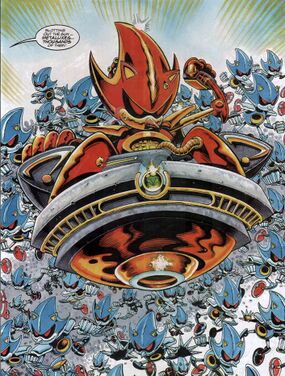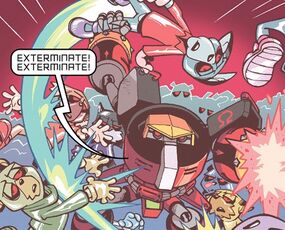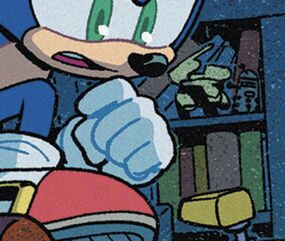Sonic the Hedgehog (franchise): Difference between revisions
| Line 94: | Line 94: | ||
=== Archie Comics series === | === Archie Comics series === | ||
[[Andrew Pepoy]], one of the artists of the [[Second Doctor]]'s [[Prologue: The Second Doctor (comic story)|prologue]] to ''[[Supremacy of the Cybermen (comic story)|Supremacy of the Cybermen]]'', was a regular inker throughout the | [[Andrew Pepoy]], one of the artists of the [[Second Doctor]]'s [[Prologue: The Second Doctor (comic story)|prologue]] to ''[[Supremacy of the Cybermen (comic story)|Supremacy of the Cybermen]]'', was a regular inker throughout the comic's run. | ||
[[Dan Slott]], the American comic book professional who appeared on a [[2015]] edition of ''[[The Fan Show]]'', was a guest writer of two stories for Archie's ''Sonic Super Special'' series. | [[Dan Slott]], the American comic book professional who appeared on a [[2015]] edition of ''[[The Fan Show]]'', was a guest writer of two stories for Archie's ''Sonic Super Special'' series. | ||
Revision as of 17:54, 29 October 2022
- You may wish to consult
Sonic the Hedgehog (disambiguation)for other, similarly-named pages.
Sonic the Hedgehog is a series consisting primarily of video games released by the Japanese entertainment company SEGA, and a vast variety of spinoff media such as comic books, television series, theatrical films, and other merchandise.
The series follows the adventures of the titular character, an anthropomorphic blue hedgehog who can run at supersonic speeds, who battles against the evil plots of Doctor Ivo "Eggman" Robotnik, who is intent on conquering the world with his robotic minions.
Outside of a single explicit crossover in LEGO Dimensions, the Sonic franchise and the DWU each yield of number of references and shared backgrounds with each other.
Crossovers
Sonic's universe has had one official crossover with the Doctor Who universe via the mass crossover toys-to-life video game, LEGO Dimensions. The Sonic franchise was added to the game via its second wave of figurines and adventure packs on 18 November 2016, joining Doctor Who and the other existing franchise elements that were built into the game upon its original release.
This inclusion allowed players to control Sonic and have him play through the Dalek Extermination of Earth story, and explore the Who-themed adventure world, as well as operate K9 and interact with the Doctor's TARDIS.
In turn, this allowed the player to play as the Doctor or the Cyberman during the Sonic Dimensions story and explore Sonic's own adventure world, as well as using two related vehicles, the Blue Speedster and the Tornado, in any world.
Sonic himself has a unique voice clip that plays when he is paired with the Doctor on the game board: "Hey, you're the Doctor, right? I heard you named a screwdriver after me. How cool is that?"
In promotional material related to the game, the two franchises first appeared together in the trailer New Adventures Await!, although they did not share any scenes together; following the Doctor and the TARDIS making an appearance earlier in the trailer, Sonic appears at the end, where he is seen swiping a ring from Gollum.
In Sonic the Hedgehog Joins LEGO Dimensions!, a trailer made up entirely of gameplay clips, a scene occurs in which Sonic appears inside the early 1960s rendition of the TARDIS, where he runs up beside the Twelfth Doctor at his blackboard, with the Doctor turning to the hedgehog and whipping out his sonic screwdriver in surprise.
Sonic is voiced in the game by his regular English voice actor, Roger Craig Smith.
References in Doctor Who media
Sonic the Hedgehog references in the DWU have occurred, so far, exclusively in literature.
The first such reference to appear was in the 1994 novel Conundrum, in which Mel Joseph, a construct of the Land of Fiction, was said to be playing the original Sonic the Hedgehog game, a play through in which he'd cleared the games penultimate level, the Scrap Brain Zone.
Another reference appeared that same year in All-Consuming Fire, in which Ace jokingly told Dr John Watson that whatever the Rakshassi where worshipping, "it wasn't Sonic the Hedgehog".
The 1997 novel Business Unusual contained a reference that appeared to partially conflict with Sonic's real world history. In the story, the Brigadier made reference to Sonic, being aware that he was a blue hedgehog. As the story is set in 1989, this would appear to suggest that Sonic made his first appearance in the DWU at least two years ahead of his real world counterpart.
Mickey Smith claimed to own a copy of the original game on either his Playstation or Xbox in the 2005 novel, Winner Takes All. The game could, indeed, be played on those platforms by that time, via such titles as Sonic Mega Collection Plus.
Martha Jones, in 2007's Forever Autumn, called the Tenth Doctor's hair "very Sonic the Hedgehog", to the Doctor's dismay, who claimed to be going for "more of a Sid Vicious vibe".
References to the DWU in Sonic the Hedgehog media
As with the DWU and its Sonic references appearing, thus far, in a single non-televised medium, Sonic's own nods to the Time Lord have also appeared in a single medium outside of the video games of which he originated. In this case, during the Hedgehog's extensive run in comic books.
The UK-based series published by Fleetway, Sonic the Comic, which ran from 1993 to 2002, offered an inherently British style of story and characterisation to Sonic's world, including what began as a very unintentional nod to the Daleks. Among the comic's extensive rogues gallery was a group called the Brotherhood of Metallix, in which the comic took Robotnik's singular robotic Sonic-Doppelgänger from the games, and turned it into a fearsome, very Dalek-like, warmongering species led by an "Emperor Metallix". Nigel Kitching, one of the comics most prolific writers, and creator of the group, acknowledged the similarity after older readers began to pick up on it. Kitching explained that he did not initially set out to "rip off" the Daleks, but chose to run with the idea as the group were developed. He further stated that, since Doctor Who was off the air at the time, he believed the similarity was unlikely to jar the series' readership.[1]
On the other side of the pond was perhaps Sonic's most prolific comic book run: the American Archie Comics series that ran continuously for a record-breaking twenty-four years, from 1993 to 2017. A subtle Doctor Who nod occurred toward the end of World's Unite, a massive crossover between Sonic and Archie's Mega Man comic book (based on the Capcom game series of the same name). At the end of a multiverse-spanning plot that was ultimately undone by a time travel paradox, Sonic character Sticks the Badger finished off by explaining her own theory about time and space, during which she used the first half of the (in)famous phrase first coined by the Tenth Doctor and popularised by the Eleventh: "wibbly wobbly".
After the aforementioned comic's cancellation, the American Sonic comic license was picked up by former American Doctor Who comic publisher, IDW Publishing, during which Doctor Who has, so far, been referenced twice.
In issue 19, the robot character E-123 Omega was seen taking out a barrage of enemies while exclaiming "exterminate" in a manner very similar to the Daleks.
The second reference was also Dalek-related: in issue 49, a shelf in Tails' house appeared to display, among other things, a Dalek figurine.
Behind the scenes connections
Video games
For the UK-based developer TT Games, LEGO Dimensions was far from being the only Sonic-related game that they had a hand in, having previously developed two pivotal titles in Sonic's series: in the late 1990s, they developed the games Sonic 3D: Flickies' Island (3D Blast in the US) and Sonic R, two of the earliest games in the series to depict Sonic's world in 3D.
Sumo Digital, developer of The Adventure Games, developed the SEGA crossover videos games Sega Superstars Tennis, Sonic & Sega All-Stars Racing, and Sonic & All-Stars Racing Transformed, which all featured characters and elements from the Sonic universe. They later went on to develop the purely Sonic-centred title, Team Sonic Racing.
Both Sonic the Hedgehog and Doctor Who-themed avatar accessories have been officially released on the video game platform Roblox, on which an official Sonic game, Sonic Speed Simulator, was released. It is possible to dress an avatar in both Doctor Who and Sonic the Hedgehog-themed accessories at the same time.
Fleetway's Sonic the Comic
Fleetway Publications, who published the Doctor Who-related Comic Relief Comic, were the publishers of Sonic the Comic for the entirety of its eight-year run. Being a British series, it had a particularly extensive list of individuals also associated with Doctor Who in some form or another, mostly, but not exclusively, via Doctor Who Magazine.
Apart from Nigel Kitching, mentioned above, the series' other most prolific writer was The Daft Dimension creator, Lew Stringer. Stringer had contributed a number of stories significant to the comic's run, and even became the primary head writer for a period in the late 1990s when Kitching briefly left. He also created two of the comic's most popular breakout characters: Tekno the Canary and Shortfuse the Cybernik.
Richard Elson, the illustrator of the untitled Brief Encounter short story in DWM 171, was the series' longest-serving artist, and one of the most prolific, having illustrated some of series' most narratively-significant stories and multiple covers.
Gary Knight, a designer for Doctor Who Magazine, served the same role on StC for, reportedly, the near-entirety of its run, beginning with issue 28.
Anthony Williams, who drew The Curious Tale of Spring-Heeled Jack, was an infrequent artist for the series' earlier issues, who was most notable for drawing the comic's very first strip, Enter: Sonic.
Alan McKenzie, comic writer and features editor for Doctor Who Magazine in its Weekly/Monthly incarnations, wrote many early stories, including the aforementioned Enter: Sonic.
A number of strips in StC's early years were written by accomplished comics writer, and Behind the Sofa: Celebrity Memories of Doctor Who contributor, Mark Millar.
John M. Burns, who was a co-artist on The Age of Chaos, was a colourist on a large number of StC stories.
Doctor Who Magazine letterer, Elitta Fell, worked the same job for StC, working on the series for almost its entire run.
The Greatest Gamble and Junk-Yard Demon artist, Mike McMahon, was another long-serving artist for the series, being an especially prominent contributor during the latter half of the comic's run, drawing multiple stories and covers.
Andy Diggle, who served as the head writer on IDW's final stretch of Doctor Who, was previously StC's last ever editor, taking on the role for the final six months of the comics run of new strips.
Steve Cook was a designer and photographer on both Doctor Who Magazine and StC.
Archie Comics series
Andrew Pepoy, one of the artists of the Second Doctor's prologue to Supremacy of the Cybermen, was a regular inker throughout the comic's run.
Dan Slott, the American comic book professional who appeared on a 2015 edition of The Fan Show, was a guest writer of two stories for Archie's Sonic Super Special series.
Other comic books and literature
Virgin Books, the most prolific publisher of Doctor Who novels during the show's wilderness years, including the aforementioned Conundrum and All-Consuming Fire, also published their own series of original children's novels based on the Sonic series in the early 1990s.
Jonathan Green, a prolific gamebook writer who wrote the final Decide Your Destiny book, The Horror of Howling Hill, co-wrote the last two books in Fantail's Sonic gamebook series, Theme Park Panic, and Stormin' Sonic.
IDW Publishing, the American publisher of Doctor Who comics from 2008 to 2013, is the current US publisher of Sonic the Hedgehog comics, with an ongoing series that began in 2018.
A reoccurring artist on the IDW Sonic team is former, occasional Doctor Who Adventures artist, Jack Lawrence.
Miscellaneous
American voice actor Frank Welker, who voiced a handful of characters in LEGO Dimensions, including those who interacted with DWU elements, and other related media, previously provided additional voices for Sonic's Saturday morning cartoon series in 1993.
Notes
- The title of the Doctor Who: Legacy game, Sonic Adventure, is identical to that of the Sonic game released for the Dreamcast in the late 1990s.





